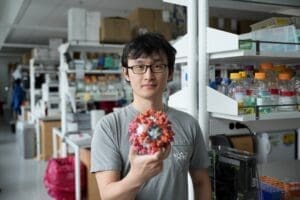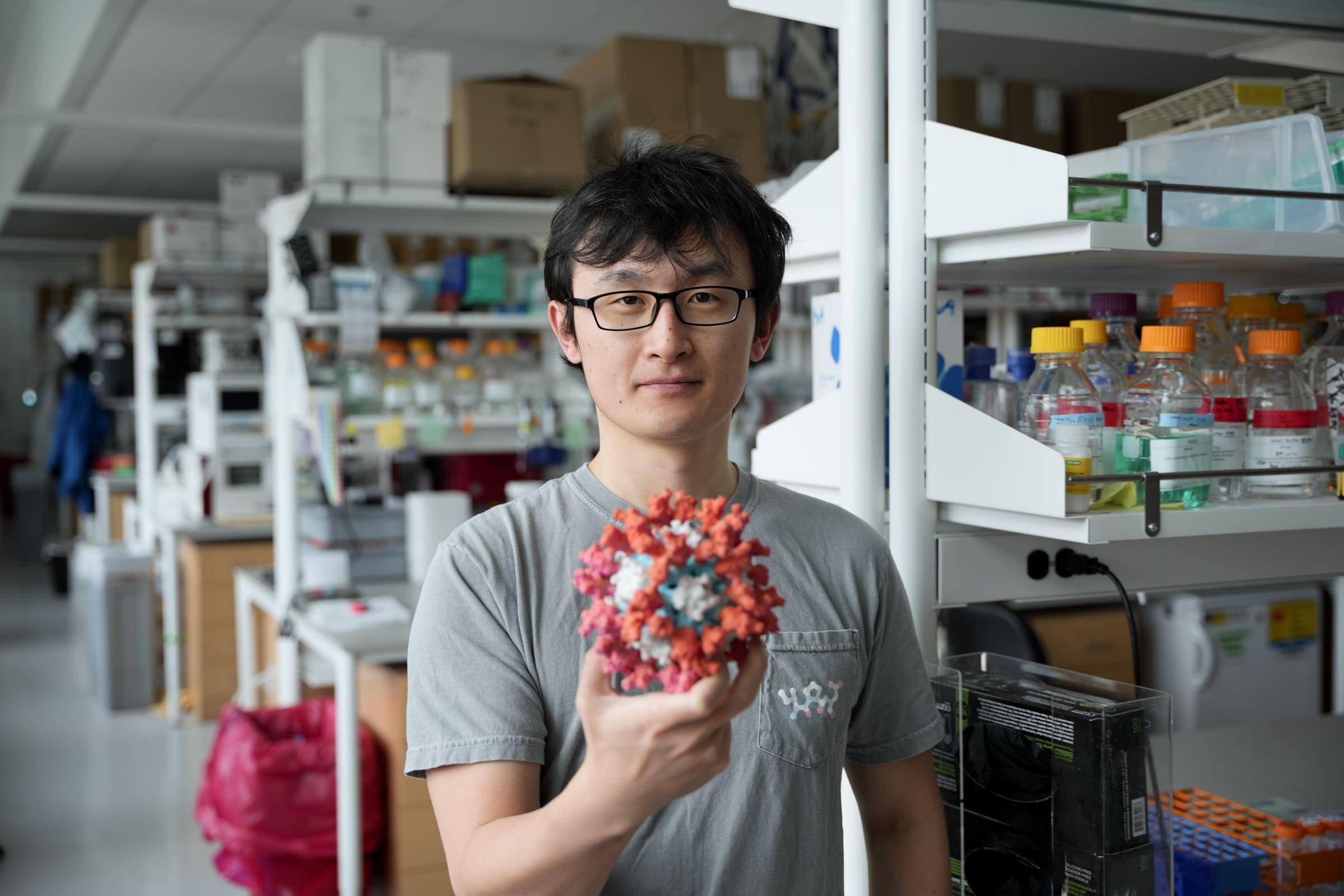Dr. Bingxu Liu’s Research Unveils Stimulator of Interferon Genes as Pivotal Immune Sensor Channel

Dr. Bingxu Liu, 2024 Michelson Philanthropies & Science Prize for Immunology Recipient. Credit: UW Institute for Protein Design
LOS ANGELES, CA – Dr. Bingxu Liu has been awarded the 2024 Michelson Philanthropies & Science Prize for Immunology for his work in furthering the understanding of how the human immune system senses dangerous invading pathogens.
Dr. Liu’s prize winning essay, published in the February 16 issue of Science, investigates the role Stimulator of Interferon Genes, or STING, plays in including multiple distinct defenses against viruses, bacteria, and tumors, and how this protein orchestrates a myriad of downstream responses upon activation – resolving a significant mystery in the field of innate immunity.
“The Science editors and jury of experts were excited by the ground-breaking nature of Liu’s doctoral work, which reports the first known immune sensor in human cells to transport ions in response to pathogens,” said Sarah Ross, associate editor at Science. “This fundamental discovery may help drive the development of next-generation vaccines and cancer immunotherapies.”
The sensing and clearance of invading pathogens are crucial to the survival of living systems, ranging from bacteria to humans. This is accomplished by an intricate web of innate immune receptors that detect pathogen-specific molecules called pathogen-associated molecular patterns (PAMPS). Once activated, these receptors trigger downstream immune responses designed to defend against that particular invading pathogen.
However, some sensors exhibit additional behaviors upon activation. For example, activation of STING – a well-known human immune sensor – not only induces inflammation, but it also triggers non-canonical autophagy, inflammasome activation and cell death, thus inducing multiple defenses against different types of pathogens. How STING controls these diverse downstream responses has remained unknown.
Using a variety of genetic, biochemical, and structural tools, Dr. Liu and his colleagues at the Massachusetts Institute of Technology discovered that human STING plays a surprising role as an ion channel.
To his knowledge, it is the first ion channel that is known to sense danger in mammalian cells, said Dr. Liu.
Furthermore, the discovery hints at the adaptability of innate immune proteins like STING, suggesting that they have evolved to acquire diverse new functions over time.
“STING is one of the most promising targets whose activation can activate immune cells to kill cancer cells. However, STING’s multiple downstream effects may not be synergistic or even antagonistic for optimal therapeutic benefits,” said Dr. Liu. “Our discovery enables separation of interferon induction and downstream responses from ion flow, possibly enabling the best benefits through precise manipulation of STING pathways.”
2024 Finalists
Dr. Gabriele Casirati is a finalist for his essay “Stem cells in disguise: How epitope editing can empower targeted cancer immunotherapies.” Casirati received his MD degree from the Università degli Studi di Milano and Ph.D. from Università Milano-Bicocca. He is currently a postdoctoral research fellow at Boston Children’s Hospital, where his research focuses on new gene-editing approaches to enhance targeted immunotherapies for hematological malignancies.
Dr. Carla Nowosad is a finalist for her essay “Who goes there? How B cells assess risk in the intestine.” Nowosad received undergraduate degrees from the University of Warwick and a Ph.D. from the Francis Crick Institute, National Institute for Medical Research Mill Hill. After completing her postdoctoral fellowship at Rockefeller University, Nowosad started her laboratory in the department of Pathology and the Translational Immunology Center at New York University Grossman School of Medicine. Her research focuses on how B cells make decisions in the complex microenvironment of the intestine.
“Breakthroughs in immunology hold the potential to deliver transformative medical treatments and therapies,” said Dr. Gary K. Michelson, founder, and co-chair of Michelson Philanthropies. “Dr. Bingxu Liu’s winning paper and research suggest that our innate immune recognition molecules can be actively adapted, which may one day lead to treatments that help our bodies engineer better responses in immunotherapy for cancer and autoimmune diseases — two of the biggest threats to human health today. We hope his exceptional work, and that of our two finalists, Dr. Carla Nowosad and Dr. Gabriele Casirati, will generate broader support for brilliant early-career scientists who are willing to engage in high-risk, high-reward research.”
The Michelson Philanthropies & Science Prize for Immunology focuses on transformative research in human immunology, with trans-disease applications to accelerate vaccine and immunotherapeutic discovery. This international prize is intended to encourage and support early-career investigators from a wide range of disciplines, including computer science, artificial intelligence/machine learning, protein engineering, nanotechnology, genomics, parasitology and tropical medicine, neurodegenerative diseases, and gene editing, who apply their expertise to perform research that has a lasting impact on vaccine discovery and immunotherapy.
###
About Michelson Philanthropies
Michelson Philanthropies is devoted to driving systemic change to advance medical research, animal welfare, education and equity, and intellectual property. It was created and is co-chaired by Giving Pledge members Alya and Dr. Gary K. Michelson to support vulnerable and underserved communities through catalytic grantmaking, social enterprises, impact investments, and energetic public advocacy. The philanthropies are comprised of 501(c)(3) private operating foundations that include Michelson Medical Research Foundation, Michelson Found Animals Foundation, Michelson 20MM Foundation, Michelson Institute for Intellectual Property, and the Michelson Center for Public Policy, a nonprofit 501(c)(4) social welfare organization. Learn more at MichelsonPhilanthropies.org.
About Science/AAAS
The American Association for the Advancement of Science (AAAS) is the world’s largest general scientific society and publisher of the journal Science, as well as Science Translational Medicine; Science Signaling; a digital, open-access journal, Science Advances; Science Immunology; and Science Robotics. AAAS was founded in 1848 and includes more than 250 affiliated societies and academies of science, serving 10 million individuals. Science has the largest paid circulation of any peer-reviewed general science journal in the world. The nonprofit AAAS is open to all and fulfills its mission to “advance science and serve society” through initiatives in science policy, international programs, science education, public engagement and more.
Contact: Kathryn Dunn, k.dunn@michelsonphilanthropies.org, 781.738.0730

